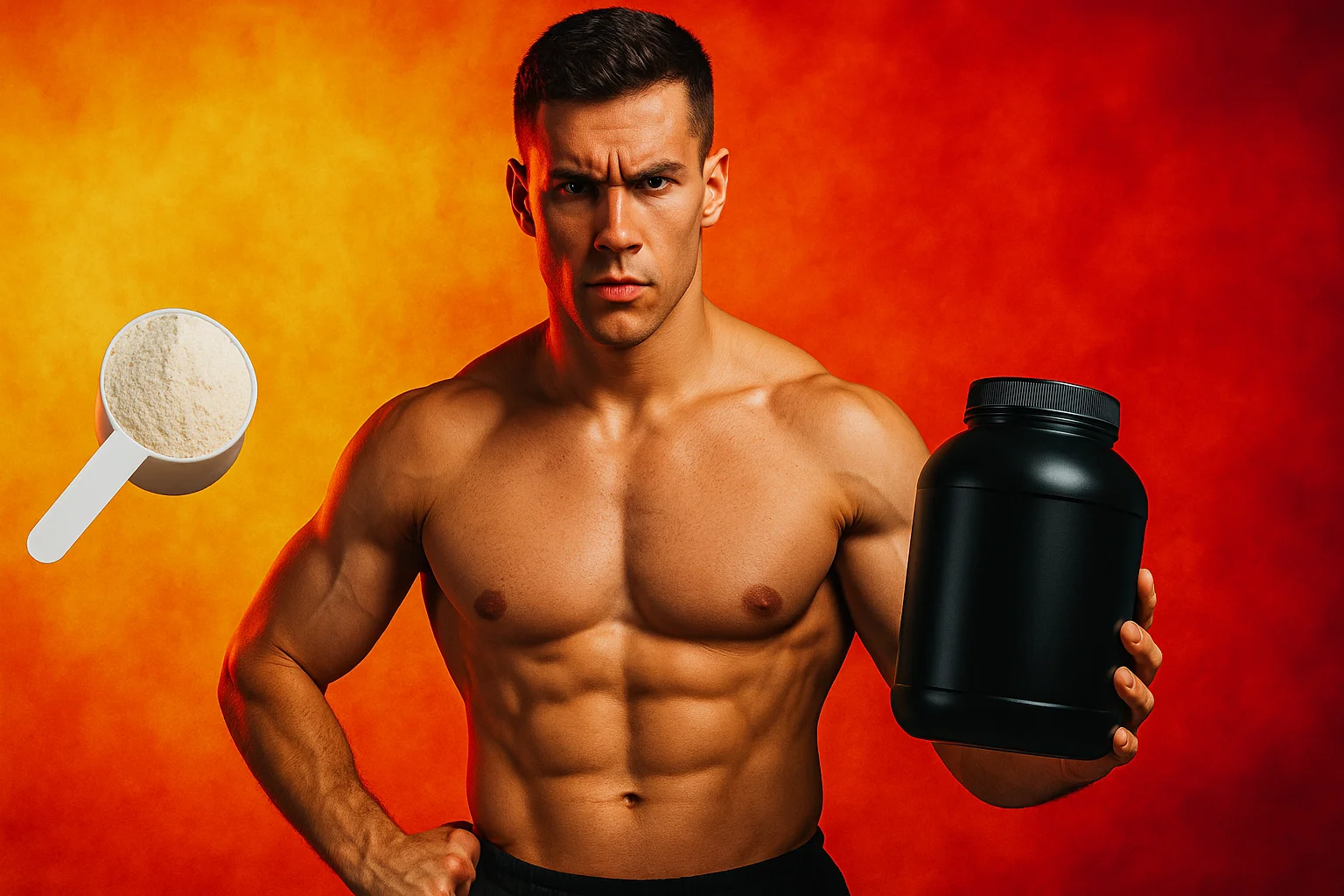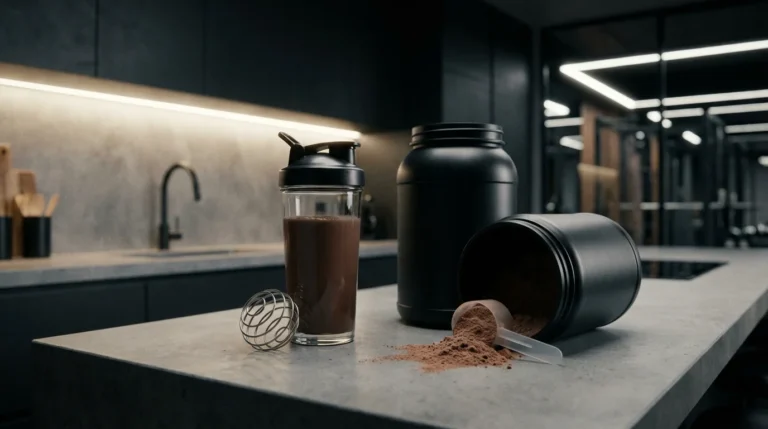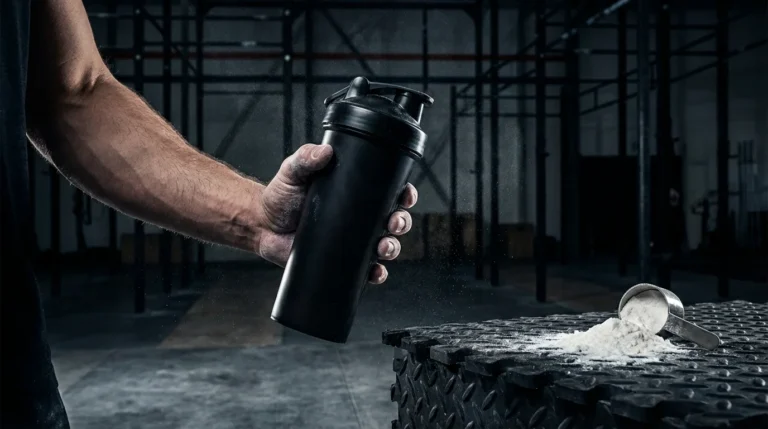Testosterone is the main hormone in men.
It helps with growth, sexual function, mood, energy, hair growth, and bone health. Many men over 45 in the U.S. look for natural ways to boost their testosterone levels because up to 39% have low levels.
The Brazil nut is getting attention for its selenium content. But does selenium really help increase testosterone? Let’s look at the science to find out.
Key Takeaways about Does Selenium Increase Testosterone
- Selenium has been shown to increase free testosterone levels in several studies.
- Combining selenium with other minerals like zinc and magnesium may provide the greatest benefits for testosterone production.
- The research on selenium and testosterone is mixed, with some studies finding positive effects and others finding no significant impact.
- More research is needed to fully understand the relationship between selenium, Brazil nuts, and testosterone levels.
- Selenium can be toxic in high doses, so it’s important to consume it in moderation, such as through a balanced diet or controlled supplementation.
What the Science Says About Selenium and Testosterone
Selenium and testosterone have a link that scientists are still studying. Selenium is a key mineral that helps with many body functions. It also helps make testosterone, a hormone important for men.
Studies on Selenium Supplementation and Testosterone Levels
A study looked at 50 infertile men and 20 fertile men. It found a strong link between selenium and testosterone in both groups, especially in the infertile men. Another study with 468 men showed that taking selenium helped increase semen production.
Over 1,000 teens, both boys and girls, were studied. Higher selenium levels meant more testosterone for boys. A study with elite male cyclists found that zinc supplements raised testosterone levels in that group.
Limitations and Need for More Research
Studies suggest selenium might help testosterone, but not all agree. Some found no effect or even harm from too much selenium. Most studies used supplements, not foods like Brazil nuts. We need more research on Brazil nuts and testosterone.
The link between selenium and testosterone is complex. Different studies show different results. We need more research, especially on Brazil nuts, to understand this better.
Brazil Nuts: A Natural Source of Selenium
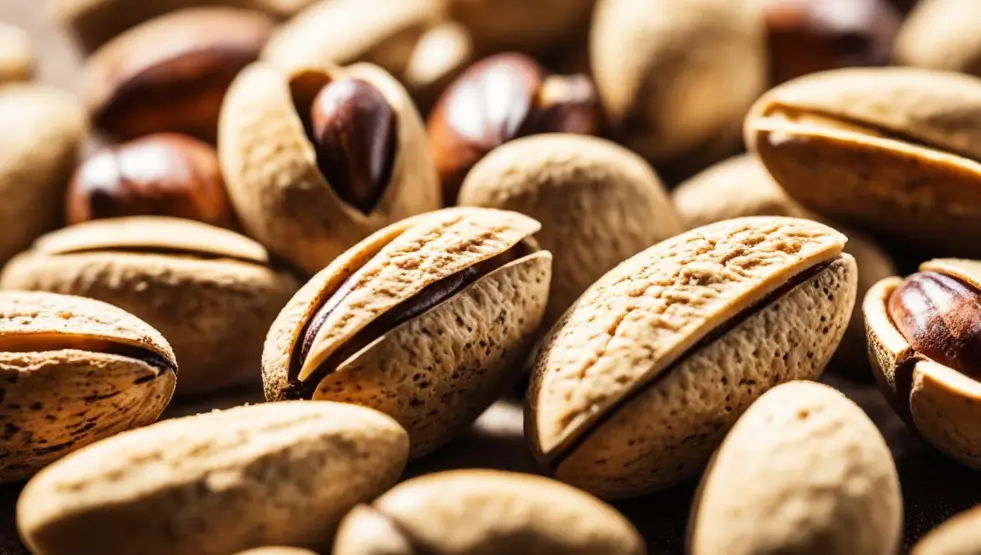
Brazil nuts are packed with selenium, offering 988% of the daily value in just 1 ounce. This makes them a top choice for men wanting to boost their testosterone naturally.
Selenium is key for keeping testosterone levels healthy. Men need about 55 micrograms a day. Brazil nuts give you around 70 micrograms per nut. They’re perfect for men looking to support their testosterone with food.
| Nutrient | Recommended Daily Intake for Men | Amount in Brazil Nuts (1 oz serving) |
|---|---|---|
| Selenium | 55 micrograms | 174% of the DV (988 micrograms) |
| Zinc | 11 milligrams | Not specified |
| Magnesium | Not specified | Not specified |
| Vitamin D | 15 micrograms | Not specified |
Brazil nuts are full of important minerals like zinc, magnesium, and vitamin D too. These help keep testosterone levels and reproductive health in check.
“Brazil nuts are a natural, nutrient-dense way for men to support their testosterone levels and overall reproductive health.”
Other Benefits of Brazil Nuts
Beyond their effect on testosterone, Brazil nuts have many health benefits. They are packed with antioxidants like selenium, vitamin E, and ellagic acid. These help fight oxidative stress and boost overall health.
Antioxidant Properties
Brazil nuts are famous for their selenium content. Just one nut gives you about 95 mg of this key mineral. Selenium acts as a strong antioxidant. It shields cells from harm by free radicals. This can help keep the thyroid healthy, which is key for metabolism and body functions.
Potential Benefits for Heart, Brain, and Blood Sugar
Studies show that eating Brazil nuts can be good for the heart. They might lower LDL (bad) cholesterol and raise HDL (good) cholesterol. This can keep the heart healthy. Plus, the magnesium and L-arginine in them could help the brain and control blood sugar levels.
Even though these benefits look promising, we need more studies to know how much Brazil nuts help with heart, brain, and blood sugar health.
| Nutrient | Benefits |
|---|---|
| Selenium | Antioxidant properties, thyroid function support |
| Magnesium | Heart health, brain function, blood sugar regulation |
| L-Arginine | Improved blood flow, natural aphrodisiac |
“Consuming Brazil nuts in moderation is advised, as they are high in calories and fats which can lead to increased energy intake.”
Dangers of Eating Too Many Brazil Nuts
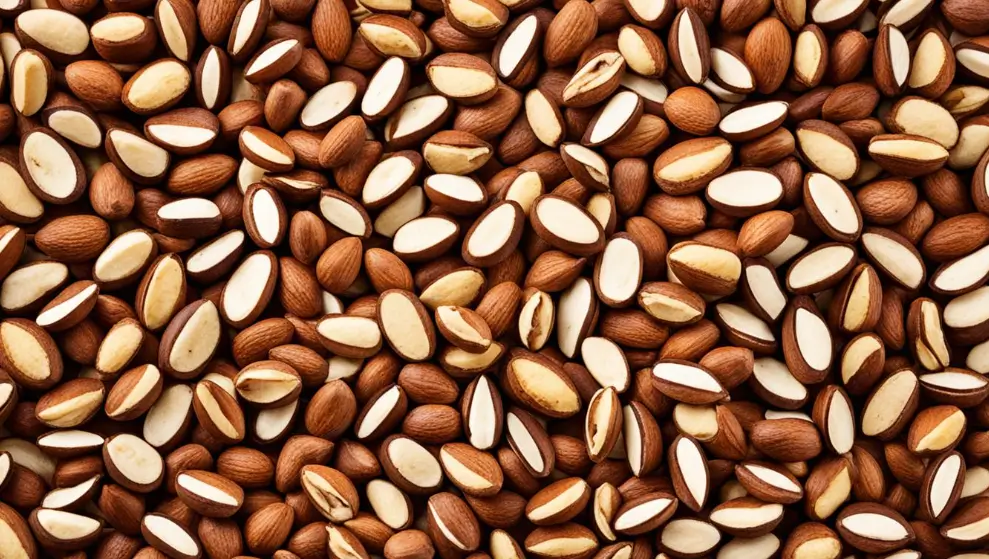
Brazil nuts are great for health, but eating too many can be bad. They have a lot of selenium. Eating more than 5,000 micrograms (mcg) of selenium a day can cause selenium toxicity. This can lead to stomach problems, hair loss, brittle nails, feeling tired, skin issues, and pain in muscles and joints.
Too much selenium can also cause serious problems like kidney and heart failure. The safe amount is 400 mcg a day, which is about 4 Brazil nuts. To stay safe, eat only 1-3 Brazil nuts a day.
| Nutrient | Recommended Daily Intake | Tolerable Upper Intake Level |
|---|---|---|
| Selenium | 55 mcg | 400 mcg |
Be careful with the selenium in Brazil nuts. Eating them in moderation is key to avoiding selenium toxicity. Stick to the recommended amounts to enjoy their health benefits safely.
Does Selenium Increase Testosterone? Facts
Research is ongoing on how selenium affects testosterone levels. Some studies suggest that selenium supplements or foods like Brazil nuts can boost testosterone and improve fertility. But, not all findings are clear-cut.
Several studies have shown promising results:
- Selenium supplements can make testosterone more available in the body.
- Studies show selenium can increase testosterone in men with fertility issues after 26 weeks of taking it.
- Research in 2019 and 2020 found a link between selenium and higher testosterone levels.
- Selenium’s antioxidants can improve athletic performance and muscle growth, which helps with testosterone production.
But, the impact of selenium on testosterone is not fully understood. Some studies found no effect, and a few suggested it could lower testosterone and sperm quality. We need more research to understand how selenium affects testosterone.
Studies suggest that combining selenium with minerals like zinc, magnesium, and copper might work better for testosterone. For example, a study on cyclists found that zinc and selenium supplements raised testosterone levels after exercise.
| Mineral | Relationship with Testosterone |
|---|---|
| Selenium | Potential to increase the bioavailability of testosterone by separating it from sex hormone-binding globulin |
| Zinc | Improves testosterone in male adults |
| Copper | Reverse impact on testosterone but positively influences sex hormone-binding globulin |
In conclusion, the link between selenium and testosterone is still being studied. Some studies look promising, but we need more research to understand selenium’s effects on testosterone and fertility.
Natural Ways to Increase Testosterone Levels
While the link between selenium and Brazil nuts and testosterone is unclear, other methods are proven to boost testosterone. These include regular exercise, good sleep, and managing stress well.
Exercise, Sleep, and Stress Management
Working out, especially with weightlifting and high-intensity interval training, can raise testosterone levels. Sleeping 7-9 hours each night is also key, as stress can lower testosterone. Stress management, like meditation or yoga, helps keep testosterone healthy.
Dietary and Lifestyle Factors
Eating a healthy diet with foods like proteins, fats, fruits, and veggies boosts testosterone. Avoiding refined and processed foods is also good. Getting enough sleep and managing stress also helps increase testosterone naturally.
“Proper nutrition and a balanced diet are emphasized as key factors in maintaining optimal testosterone levels and overall hormonal health.”
By using these natural methods, people can support their hormone and reproductive health. This approach avoids the risks of supplements or medications.
Symptoms of Low Testosterone
Low testosterone, also known as hypogonadism, shows through many symptoms. It affects 1.2–12.8% of males. If you notice any of these signs, talk to your healthcare provider for help.
- Fatigue and decreased energy levels
- Reduced sex drive and sexual dysfunction
- Muscle loss and decreased strength
- Increased body fat, particularly around the abdomen
- Mood changes, such as depression or irritability
- Reduced bone density and increased risk of osteoporosis
- Hair loss, including facial and body hair
- Difficulty concentrating and memory problems
Low testosterone can also be a sign of another health issue. This includes problems with the pituitary gland, testicular injuries, or chronic diseases like diabetes or obesity. Finding and treating the cause can help fix these symptoms and improve your health.
If you see any signs of low testosterone, get medical advice. Your healthcare provider can test you and suggest the best treatment. This can greatly improve your life quality.
The Role of Minerals in Testosterone Production
Keeping testosterone levels healthy is key for good health. Minerals like zinc and selenium are very important for making testosterone.
Zinc, Selenium, and Other Essential Minerals
Zinc is key for over 300 body processes, including making testosterone. Zinc supplements can boost testosterone levels, especially when you exercise. Selenium also helps with testosterone and sperm quality, but the science is not all clear.
Other minerals like magnesium might help with testosterone too. Getting enough of these minerals can support natural testosterone production. You can get them from food or supplements.
“Optimal selenium plasma levels may be important to minimize chronic exercise-induced oxidative effects and modulate the exercise effect on mitochondrial changes.”
The selenoprotein family is vital for fighting off free radicals, processing hormones, and muscle function. Taking selenium supplements can raise blood levels, helping protect muscles from damage during exercise.
Selenium does more than fight free radicals. It can help prevent cancer, support reproductive health, work in the endocrine system, and boost the immune system. Getting enough of these minerals is important for making testosterone naturally.
Conclusion
The link between selenium in Brazil nuts and testosterone is still unclear. Some studies hint at selenium helping boost testosterone and improve male fertility. Yet, other research shows no clear effect or even negative outcomes. We need more solid studies to understand how Brazil nuts affect testosterone.
Until then, focusing on proven ways to boost testosterone is wise. This includes exercise, good sleep, managing stress, and eating well. If you think your testosterone levels are low, talk to your doctor to find out why and what to do about it.
More research is needed to fully link selenium, Brazil nuts, and testosterone. For now, a balanced diet and lifestyle are the best ways to keep testosterone levels healthy.
Frequently Asked Questions
Does selenium really increase testosterone?
The research on selenium and testosterone is ongoing and shows mixed results. Some studies suggest selenium supplements or selenium-rich foods like Brazil nuts might increase testosterone and improve fertility, while others find no benefit or even negative effects on sperm quality.
What does research say about selenium and testosterone?
Some research indicates selenium supplements could benefit testosterone levels or fertility by improving semen quality. However, study findings are inconsistent, with some showing positive effects and others not. More research is needed to fully understand selenium's impact on testosterone.
Are Brazil nuts a good source of selenium?
Yes, Brazil nuts are an extremely rich source of selenium, providing about 988% of the daily recommended value in just one ounce. This makes them a popular natural way to potentially increase selenium intake.
Are there risks to eating too many Brazil nuts?
Yes, due to their very high selenium content, eating too many Brazil nuts can be harmful. Consuming over 5,000 mcg per day, roughly equivalent to about 50 nuts, can lead to selenium poisoning, which can cause serious health problems.
What are other natural ways to boost testosterone levels?
Besides selenium and Brazil nuts, other natural methods to potentially increase testosterone include getting adequate sleep (7-9 hours), managing stress, eating a healthy diet, and engaging in regular exercise, particularly weightlifting and high-intensity workouts.
What are the symptoms of low testosterone?
Symptoms of low testosterone can include fatigue, reduced sex drive, erectile dysfunction, depression, hair loss, and loss of muscle mass. If you experience these signs, it's advisable to consult a doctor to check for underlying health conditions.
What other minerals play a role in testosterone production?
Zinc and selenium are considered key minerals for testosterone. Zinc supplements may increase testosterone, especially with exercise. Selenium may also help testosterone and sperm quality, though the evidence is mixed. Magnesium is another mineral that might support healthy testosterone levels.
